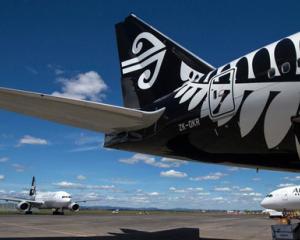Several flights rescheduled for the same time will cause a "4 o'clock swell" at Dunedin International Airport, so travellers are advised to check in early on summer afternoons.
Airport operations manager Richard Roberts said rescheduled international and domestic flights would put extra pressure on services and space in the airport at 4pm, which he referred to as "the 4 o'clock swell".
The airport terminal was designed to handle 320 people an hour, but from next Thursday more than 505 were expected at 4pm, he said.
The pressure would continue as an extra flight from Brisbane arrived and four domestic flights remained scheduled to arrive within 25 minutes of each other, he said.
The number of flights was the same as last year but the schedules had been aligned, he said.
The passenger swell would occur six days a week but the most pressure would be on Thursdays and Sundays, he said.
Airport chief executive John McCall said flight scheduling was a huge logistical exercise and flight schedules were difficult to change.
The airport terminal capacity of 320 people could be exceeded but then the service level would deteriorate, he said.
Terminal expansion was not economically feasible to meet the extra demand for just one hour a day , he said.
"It would cost millions of dollars ... it's a balancing act between putting in capital and getting productive use out."
However, some existing airport staff would be given extra hours of work to cope with demand, he said.
He recommended outbound passengers check in earlier than their airline recommended to ensure they got through security screening in time.
"You should not leave it to the last minute because there will be more people."
Airport cafes would be under more pressure but would cope, he said.
The extra pressure on car parking would be alleviated by the installation of automatic pay stations inside the terminal so people could pay for car parking before they left the terminal, he said.
More car park exits would make exiting easier, he said.
If the conference rooms were not in use during the busy period, passengers could sit there, he said.
Each airline had scheduled its flights to meet its own needs and the airport had to respond and deliver services to meet those needs, he said.
"With extra resources and with public awareness and understanding, the airport will effectively manage the ebb and flow of the 4 o'clock swell."


